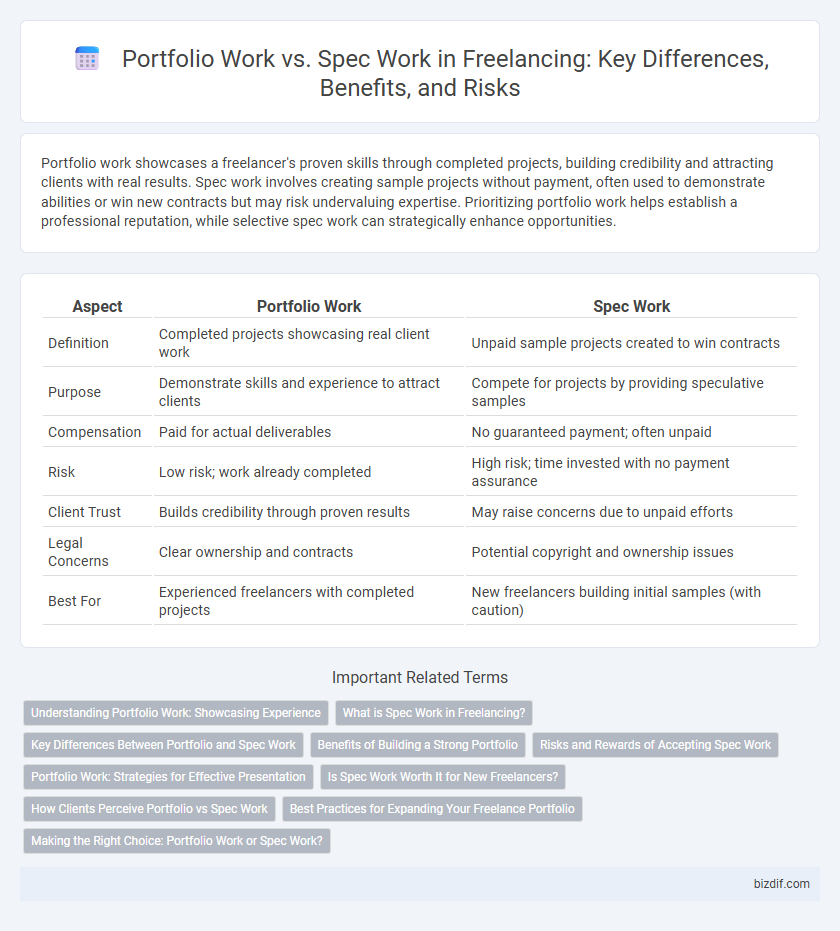Portfolio work showcases a freelancer's proven skills through completed projects, building credibility and attracting clients with real results. Spec work involves creating sample projects without payment, often used to demonstrate abilities or win new contracts but may risk undervaluing expertise. Prioritizing portfolio work helps establish a professional reputation, while selective spec work can strategically enhance opportunities.
Table of Comparison
| Aspect | Portfolio Work | Spec Work |
|---|---|---|
| Definition | Completed projects showcasing real client work | Unpaid sample projects created to win contracts |
| Purpose | Demonstrate skills and experience to attract clients | Compete for projects by providing speculative samples |
| Compensation | Paid for actual deliverables | No guaranteed payment; often unpaid |
| Risk | Low risk; work already completed | High risk; time invested with no payment assurance |
| Client Trust | Builds credibility through proven results | May raise concerns due to unpaid efforts |
| Legal Concerns | Clear ownership and contracts | Potential copyright and ownership issues |
| Best For | Experienced freelancers with completed projects | New freelancers building initial samples (with caution) |
Understanding Portfolio Work: Showcasing Experience
Portfolio work demonstrates a freelancer's proven skills and completed projects, providing tangible evidence of expertise to potential clients. It highlights actual deliverables and results, building trust and credibility through real-world examples. Showcasing diverse and high-quality portfolio items improves client confidence and increases the likelihood of project acquisition.
What is Spec Work in Freelancing?
Spec work in freelancing refers to projects where freelancers create sample work without a guaranteed payment, often to compete for a potential contract. This practice allows clients to evaluate multiple freelancers' ideas before selecting a winner, but it carries risks such as unpaid labor and undervaluing creative efforts. Understanding the balance between portfolio work, which showcases completed paid projects, and spec work is crucial for protecting freelancers' rights and building a credible career.
Key Differences Between Portfolio and Spec Work
Portfolio work demonstrates a freelancer's genuine skills and completed projects, showcasing real client results and personal expertise. Spec work involves creating sample projects or proposals without guaranteed payment, often used to win potential clients but lacking verified authenticity. The key difference lies in portfolio work reflecting validated experience, while spec work focuses on hypothetical or trial deliverables.
Benefits of Building a Strong Portfolio
Building a strong portfolio showcases real client projects and generates credibility that attracts higher-paying freelance opportunities. A well-curated portfolio demonstrates skills, reliability, and professionalism, providing tangible proof of expertise to potential clients. Consistently updated portfolio work builds client trust and long-term relationships, which are essential for sustainable freelancing success.
Risks and Rewards of Accepting Spec Work
Spec work in freelancing offers exposure and the potential to win clients without upfront payment, boosting portfolio variety; however, it carries significant risks such as unpaid labor, undervaluation of skills, and possible exploitation. Unlike portfolio work, which is completed for guaranteed compensation and helps build a reputable track record, spec work may undermine a freelancer's credibility if projects are rejected or never compensated. Weighing the rewards of portfolio diversification against the risks of non-payment and diminished professional reputation is crucial for sustainable freelancing success.
Portfolio Work: Strategies for Effective Presentation
Portfolio work demonstrates proven skills and successful project outcomes, making it crucial for attracting potential clients and building trust in freelancing. Presenting portfolio pieces with clear descriptions, measurable results, and client testimonials enhances credibility and showcases expertise effectively. Organizing work by project type or industry niche allows freelancers to target specific markets and highlight their strengths with strategic relevance.
Is Spec Work Worth It for New Freelancers?
Spec work offers new freelancers real-world projects to build their portfolios quickly, showcasing their skills to potential clients without prior experience. While it involves unpaid or low-paid tasks, spec work can lead to valuable exposure, networking opportunities, and client referrals essential for career growth. Balancing spec work with paid assignments helps new freelancers establish credibility while minimizing exploitation risks in the competitive freelancing market.
How Clients Perceive Portfolio vs Spec Work
Clients often view portfolio work as a reliable indicator of a freelancer's proven skills and creativity, showcasing completed projects that demonstrate real-world application and results. Spec work, while helpful for assessing a candidate's potential and approach, may be perceived as a theoretical exercise lacking the validation of client collaboration and project execution. Consequently, portfolio work tends to build stronger trust and credibility with clients, influencing hiring decisions more positively than speculative assignments.
Best Practices for Expanding Your Freelance Portfolio
Showcasing completed portfolio work builds credibility and demonstrates your proven skills to potential clients, while spec work can strategically fill gaps by illustrating capabilities in desired niches. Prioritize quality over quantity by selecting projects that highlight your strengths and align with target industries, ensuring each addition enhances your value proposition. Regularly update your portfolio with diverse, results-driven examples and client testimonials to attract higher-paying freelance opportunities.
Making the Right Choice: Portfolio Work or Spec Work?
Choosing between portfolio work and spec work significantly impacts your freelancing career growth and client trust. Portfolio work showcases completed, client-approved projects that demonstrate reliability and skill, while spec work involves creating sample projects without guaranteed compensation, used to win potential clients. Prioritize portfolio work to build a credible track record and attract high-quality clients, reserving spec work strategically when entering new niches or pitching to competitive clients.
Portfolio Work vs Spec Work Infographic

 bizdif.com
bizdif.com